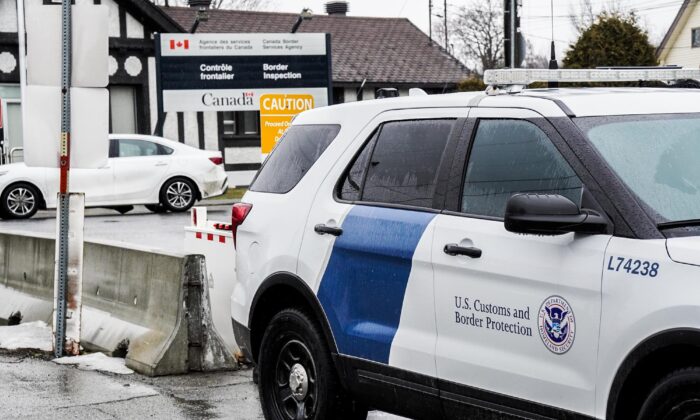U.S. Customs and Border Protection has reported an unprecedented number of migrant encounters at the border between Canada and the United States from last October through July of this year.
An “encounter” is recorded in the CBP database when border patrol agents discover an individual who has unlawfully crossed the border into the U.S. at locations other than official border crossings.
Of the eight sectors patrolled, the Swanton Sector had by far the largest number of encounters. Swanton, which runs along Quebec’s border with New York and Vermont, had 15,612 encounters. The Blain Sector between British Columbia and Washington had the second highest count at 2,278.
The figures represent more than double the 10,021 encounters recorded between border posts during the 2023 fiscal year and nearly 10 times as many as the 2,238 migrant encounters recorded in 2022.
The more than 19,000 migrants detained at the border is likely only a fraction of those crossing from Canada into the United States, the RCMP says.
Due to the nature of the crime, individuals can only be arrested once they have crossed into the U.S., which is outside of RCMP jurisdiction. That makes it difficult for the federal policing agency to collect data on both attempted and successful southbound migration, RCMP spokesperson Robin Percival told The Epoch Times in an email.
The ever-increasing issue can have dire consequences for migrants, beyond arrest, Percival said, describing the Canada-U.S. border as “vast with mixed terrains,” making it difficult and sometimes dangerous to cross.
“RCMP frontline officers have seen first-hand heart-breaking situations and are very concerned for the wellbeing of those crossing the border in dangerous ways to avoid detection,” she said. “People are putting their lives and the lives of their children at risk.”
Asylum Seekers
Rather than risk arrest, the RCMP said, both northbound and southbound migrants are “encouraged” to present themselves directly to a designated port of entry.
“This process is safer, faster and according to the law,” Percival said.
That doesn’t mean migrants can choose the country they wish to claim asylum in, however.
Originally the agreement had a loophole that this requirement applied only to official border crossings. That loophole was closed last year.
Prime Minister Justin Trudeau and U.S. President Joe Biden made the announcement last spring that, as of March 25, 2023, all asylum-seekers at unofficial border crossing points between the two countries would be turned back. The deal applies to the entire land border, including internal waterways.
“Likewise, individuals crossing from Canada to the U.S. between designated ports of entry and who make a refugee claim will be returned to Canada unless they qualify for an exception.”
The 2023 agreement update came after years of migrants making unsanctioned crossings at places such as Roxham Road, which connects New York state and the province of Quebec, to make asylum claims.
Trudeau said Canada and the United States agreed that applying the STCA to the entire border was the solution.
“Both of our countries believe in safe, fair, and orderly migration, refugee protection, and border security,” he said at the time. “After midnight tonight, police and border officers will enforce the agreement and return irregular border crossers to the closest port of entry with the United States.”
Migrant Crossings
Immigration Minister Marc Miller has described the influx of migrants crossing into the United States from Canada as “very concerning.”
Canada’s actions have to be “carefully orchestrated with our most important partner, the U.S.,” he said at a June 12 press conference.
“The border is always a constant discussion between our two big countries,” Miller said. He didn’t comment on any measures being put in place to staunch the flow of migrants using Canada to access the U.S.
In Canada, border security and integrity is a shared mandate between the Canada Border Services Agency (CBSA) and the RCMP. The RCMP is responsible for enforcing Canadian legislation between ports of entry while the CBSA is responsible for enforcing the law at Canada’s designated ports of entry.
The Canada Border Services Agency said in an email to The Epoch Times that it collaborates closely with the United States “to protect and secure our borders” but was unable to confirm whether it has allocated additional resources to deal with the growth in migrant crossings.
“We are not just neighbours managing two different sides of the border—we are partners,” said CBSA spokesperson Luke Reimer.
Miller has stated that Khan arrived in Canada in June 2023 on a student visa granted to him the previous month.
Prime Minister Justin Trudeau was asked about efforts to prevent ISIS supporters from entering the country under false pretenses. Trudeau praised the effectiveness of Canadian security services in intercepting potentially devastating situations.
The RCMP is responsible for migrant interceptions made between ports of entry in Canada. When questioned about migrants crossing into the U.S., the RCMP referred inquiries to the CBSA, stating that such matters are outside their mandate.
Migrant smuggling is a significant issue in Canada, with the RCMP launching an awareness campaign to combat the problem and educate the public about the dangers associated with dealing with smugglers or smuggling rings.
Migrant smugglers, known as “coyotes,” often subject migrants to unsafe conditions and mistreatment. Incidents of suffocation, desert deaths, and drownings have been reported during illegal border crossings.
The mistreatment of migrants by smugglers can involve violence, intimidation, sexual assault, torture, and even murder. The Canadian Press contributed to this report. Please rewrite the following sentence:
“The cat chased the mouse around the room.”
Rewritten: The mouse was chased around the room by the cat.
Source link








